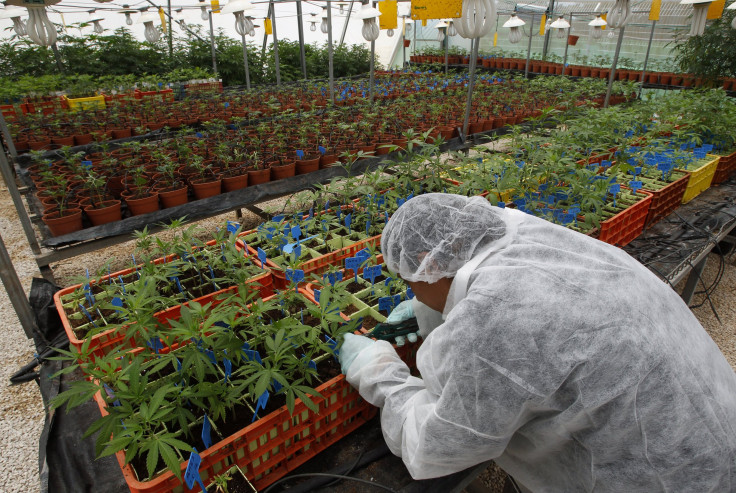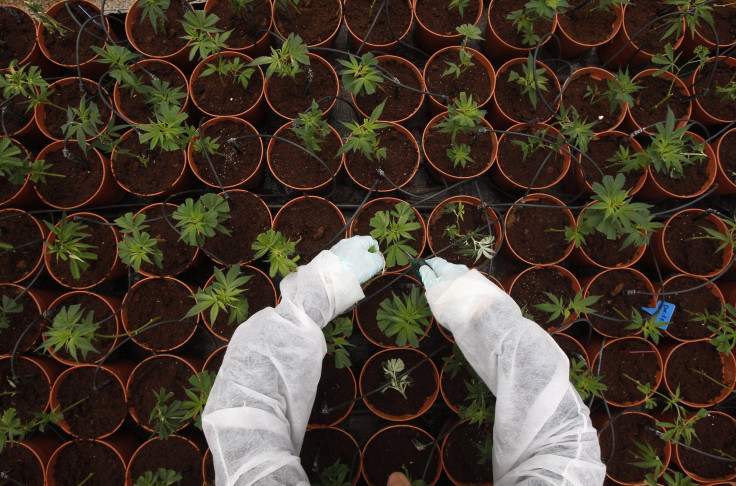Medical Marijuana Industry Anticipates High Times As US Loosens Research Restrictions

Is medical marijuana really a medicine? Is it a drug? A dietary supplement? The definition is opaque, both scientifically and politically. But scientists and policymakers took steps this week that will let researchers more closely investigate the drug's potential medical value.
On Monday, the Obama administration banished a longstanding mandatory review of marijuana research proposals by the Public Health Service, effective immediately. Supporters of the decision said the review was merely a needless extra hurdle for scientists, and in some cases those who submitted proposals waited months or years to hear back.
Dan Riffle, director of federal policies at the Marijuana Policy Project in Washington, says the shift should encourage more researchers to study marijuana, and he expects many of these scientists will examine the plant for its purported medical benefits in treating everything from pain to epileptic seizures. A handful of researchers have dabbled in studying marijuana in the past, but a dearth of placebo-controlled, double-blind clinical trials has made it difficult for them to back up medical claims.
Meanwhile, Columbia Care LLC, a New York-based healthcare company, defied the stigma that marijuana still carries in the medical community by securing a research partnership this week with the Icahn School of Medicine at Mount Sinai Hospital. The staff at Mount Sinai will review evidence the company collected through a patient registry and offer advice as to whether it should pursue treatments for two areas of unmet medical need: pain and numbness associated with HIV and loss of appetite and body mass from cancer.
Nicholas Vita, CEO of Columbia Care, says forming a partnership with a major research institution on such a stigmatized substance shatters a “glass ceiling” that he has encountered among scientific and medical leaders up to this point.
“I definitely don't think we could have been having this conversation even three years ago,” Vita said. “They have to be willing to look forward and look at the standard of care and say maybe there's a better way. And that's an incredibly unique and admirable trait for healthcare institutions to have.”

And yet, those who aspire to make medicine out of marijuana say more must be done to level the playing field if a marijuana-based drug is to compete with other pharmaceuticals, from both a scientific and political standpoint. Many of the basic conditions that exist for other medicines are still missing from the medical marijuana industry.
“When it comes down to it, physicians rely on dosing, product consistency and replicability,” Vita says. “None of those things exist today in the medical marijuana network.”
Some of these shortcomings are due to the fact that the Drug Enforcement Administration still considers marijuana a Schedule I substance, which places it in the strictest class of drug control and limits researchers' access. Riffle says the DEA must also loosen restrictions on marijuana production because the only facility that is currently permitted to grow it for research purposes in the U.S. is a lonely research farm at the University of Mississippi. This stipulation prevents pharmaceutical companies that want to develop marijuana-based medicines from growing the plant on American soil.
“In order to take a drug through the FDA approval process, you have to demonstrate standardized doses and a consistent product, and you can't do that when you're just borrowing someone else's marijuana,” Riffle says. GW Pharmaceuticals, which sells an oral spray derived from marijuana called Sativex for multiple sclerosis in a handful of countries and is seeking approval from the FDA, manufactures the drug in the U.K.
Craig Schneider is president and CEO of InMed Pharmaceuticals in Vancouver, Canada, a biotech company specializing in marijuana-based drugs. He says he once tried to find research partners in the U.S., but it was simply too difficult for these partners to obtain the compounds they needed due to the Schedule I classification. He works with the University of British Columbia in Vancouver and the University of Debrecen in Hungary instead.
“It is a little different here because there is an openness at the federal level for this type of research, primarily from companies like GW blazing the trail,” he said. “In the U.S., it's very different -- at the federal level, it's shunned.”
Back in New York, Vita at Columbia Care is trying to establish a framework of best practices on which a legitimate American medical marijuana industry may be built. He wants to pursue standards for product consistency, standardized doses and clinical trials. He intends to borrow proven methods from the pharmaceutical industry and partner with other prominent research institutions to usher medical marijuana into mainstream medicine.
“We're not just telling you it works -- we're saying, this many people are saying it works,” Vita says. “The data really turns the conversation.”
Major U.S. doctors’ groups such as the American Academy of Pediatrics and American College of Physicians have called for looser restrictions on marijuana research, but those moves haven’t necessarily led to an increase in researchers with the interest and funding to do the work, and studying marijuana still carries a stigma at many institutions.
Though Vita, a former health investment specialist for Goldman Sachs, is eager to get the industry off the ground, he also empathizes with those who wish to take a slow and steady approach. He never planned to pursue such a career until a single dose of marijuana seemed to relieve his mother’s symptoms of rheumatoid arthritis.
“To say that my household was a 'Just say no' household was a gross understatement,” he laughs. “I'm a firm believer in doing things the right way rather than the fastest way. We're trying to build an industry, and it's not about the next six months, it's about the next six decades.”

Not everyone believes that the definition of medical marijuana should be restricted to a drug derived from it. Both Riffle and Chris Brown, press secretary with Americans for Safe Access, hope the whole plant someday will be recognized as harboring medical value. Regulators might treat marijuana like an herbal supplement such as St. John’s wort rather than a prescription drug, they hope. Regardless, this week's developments in both political and scientific arenas should help supporters of either persuasion to better evaluate the benefits and risks of recommending marijuana to patients in any form.
There are other quiet rumblings of change afoot – on Wednesday, a group of U.S. senators held a hearing on barriers to research and the potential medical benefits of CBD, one of the plant’s most promising compounds, which has treated epileptic seizures in children. Earlier this month, both the Senate and the House approved an amendment to a spending bill that would prevent the federal government from meddling in state medical marijuana programs.
"I think the medicine and space itself is going to grow dramatically in the next 10 to 15 years," Schneider says. "I think it's going to be massive, and things are absolutely going to build out in the U.S. at a state-by-state level. The research is going to start opening up."
Meanwhile, Congress may still consider the Compassionate Access, Research Expansion and Respect States Act, which would protect patients and physicians who are participating in state medical marijuana programs from federal prosecution and improve access to research by expanding production and knocking marijuana down from Schedule I. But the bill is currently stuck in a committee and has “zero percent chance of being enacted” according to Govtrack.us.
Despite the progress that advocates have made so far this year, Riffle acknowledges that earning recognition of medical marijuana as either a prescription medicine or herbal supplement will still require many more steps on a long road ahead.
“I think we've made more strides this year than in the last five years combined,” Riffle says. “But that's not to say we're almost there. We would have to continue to have the kind of momentum we have for five or six more years to be at the point where researchers who want to develop drugs have access to it.”
© Copyright IBTimes 2024. All rights reserved.












